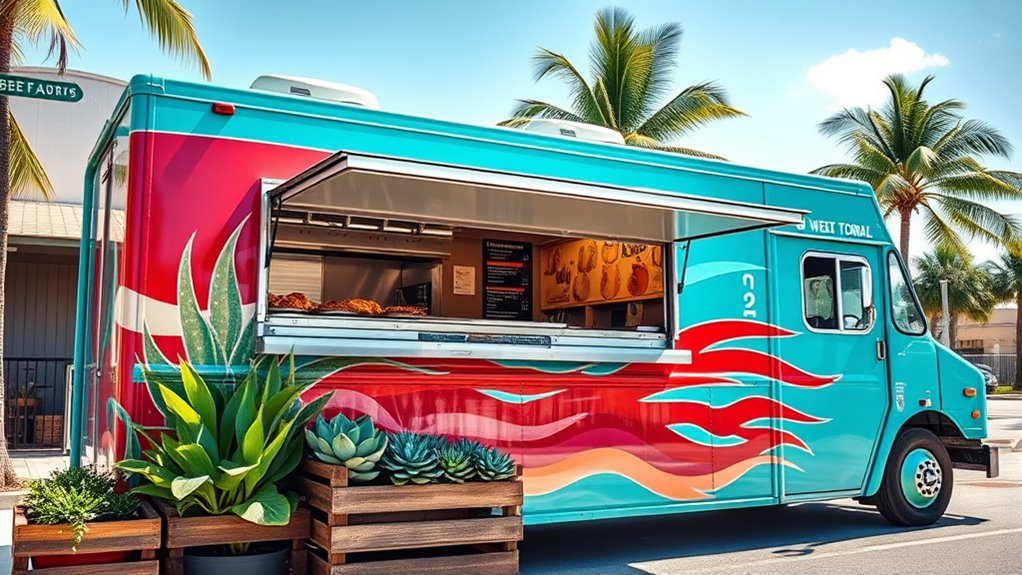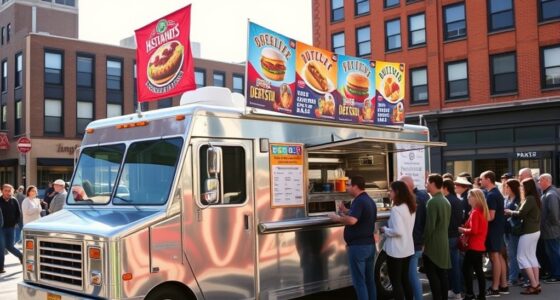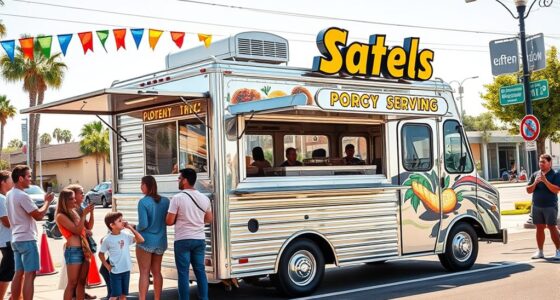To start a food truck in Cape Coral, FL, you’ll need a solid business plan, clarity on local permits, and compliance with health regulations. Secure permits online, create a catchy brand, and develop a menu tailored to local tastes. Budget carefully for vehicle setup and insurance. Use social media and participate in community events to grow your presence. Keep learning the steps involved, and you’ll be on your way to food truck success.
Key Takeaways
- Research local regulations, designated vending zones, and permit requirements through Cape Coral’s official city website.
- Develop a strong branding strategy and engaging social media presence to attract local customers.
- Secure necessary permits, health inspections, and licenses via online portals and ensure compliance with health standards.
- Budget for vehicle customization, equipment, and insurance, using AI tools and detailed financial planning.
- Build community engagement through local events, loyalty programs, and consistent branding to establish a strong presence in Cape Coral.
Starting With a Business Plan
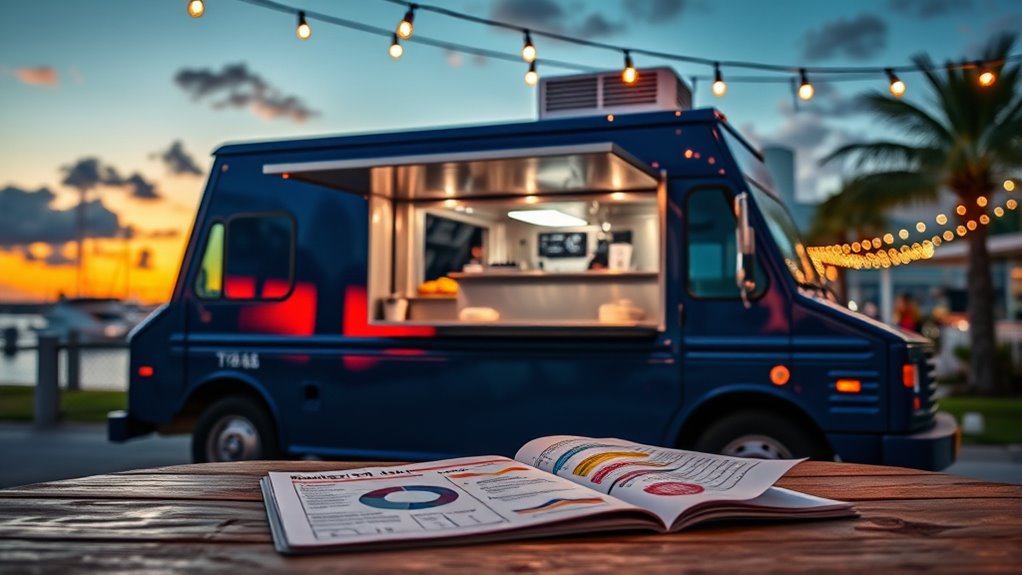
Before launching your food truck in Cape Coral, FL, it’s essential to create a solid business plan. A key part of this plan involves developing your food truck branding, which helps you stand out in a competitive market. Think about your target audience, your unique selling points, and how your brand image will resonate locally. Incorporate social media marketing strategies early on to build anticipation and connect with potential customers. Establish your presence on platforms like Instagram and Facebook to showcase your menu, share updates, and gather feedback. A well-crafted business plan ensures you stay focused, manage costs, and set achievable goals. Understanding market trends can help you tailor your offerings to current customer preferences. With clear branding and a strong online presence, you’ll be poised for success in Cape Coral’s vibrant food scene.
Understanding Local Requirements
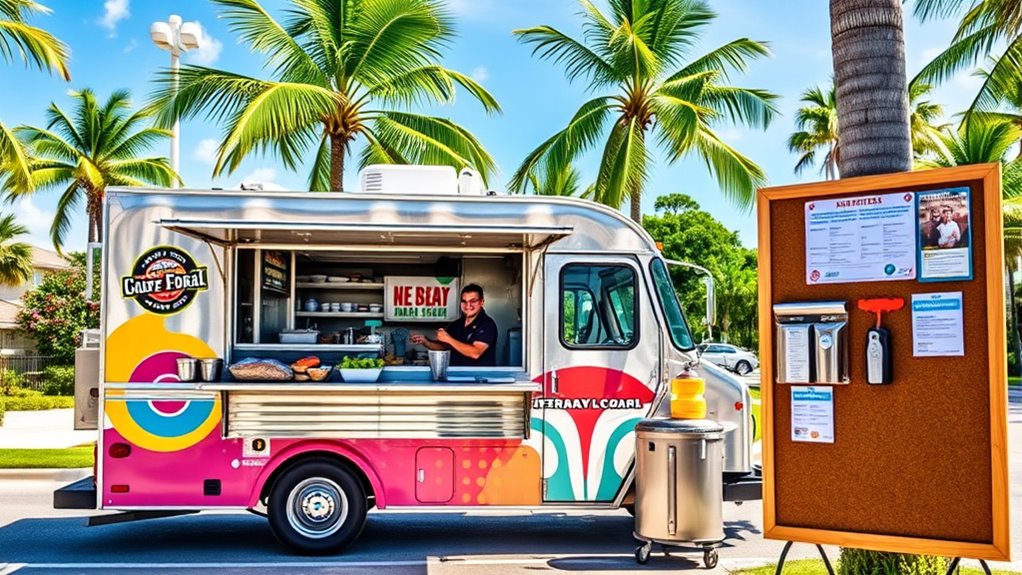
To get started, you’ll want to explore the online permit application portals to guarantee you meet all the local requirements. Checking the health inspection checklist tips helps you prepare for inspections and pass smoothly. Additionally, understanding designated street vending zones ensures you choose the right spots to serve your customers legally. Being aware of juice cleanse and detox options can also help you promote healthy beverage choices on your food truck menu.
Online Permit Application Portals
Navigating online permit application portals is a essential step in starting your food truck business in Cape Coral, FL. These online permit platforms streamline the process, allowing you to submit all required documents efficiently. First, visit the official city website and locate the relevant application portals for food truck permits. You’ll need to create an account, then complete the online permit application with accurate details about your business. Be sure to review the specific requirements for Cape Coral to avoid delays. Keep digital copies of all necessary paperwork handy, as you’ll upload them directly through the portals. Using online permit application portals simplifies the process, saving you time and helping you stay organized as you work toward launching your food truck.
Health Inspection Checklist Tips
Once you’ve submitted your online permit application, it’s important to familiarize yourself with the health inspection checklist specific to Cape Coral. This checklist guarantees your food truck meets local standards for food safety and health compliance. Review each requirement carefully, including proper food storage, sanitation practices, and equipment cleanliness. Make sure your food handling procedures prevent cross-contamination and maintain safe temperatures. Regularly audit your setup to identify potential violations before inspection day. Keep detailed records of cleaning schedules and food safety training for your staff. Staying proactive helps you avoid costly re-inspections and ensures your truck remains compliant. Understanding and adhering to Cape Coral’s health inspection criteria demonstrates your commitment to food safety and helps keep your business lawful and trustworthy.
Designated Street Vending Zones
Have you checked where Cape Coral designates street vending zones for food trucks? Understanding local requirements is vital to stay compliant with street vendor regulations and zoning codes. Cape Coral has specific areas where food trucks are permitted to operate, helping you avoid fines or penalties. These zones are designated to manage traffic, safety, and business flow. Before setting up, review city maps and signage to guarantee you’re in an authorized spot.
| Zone Type | Allowed Hours | Restrictions |
|---|---|---|
| Downtown District | 8 am – 8 pm | No parking on main thoroughfares |
| Waterfront Area | 10 am – 10 pm | Limited to certain days |
| Residential Zones | Permitted only weekends | Must follow specific signage |
Check the city’s official website for updated zones and regulations.
Setting Up Your Base of Operations
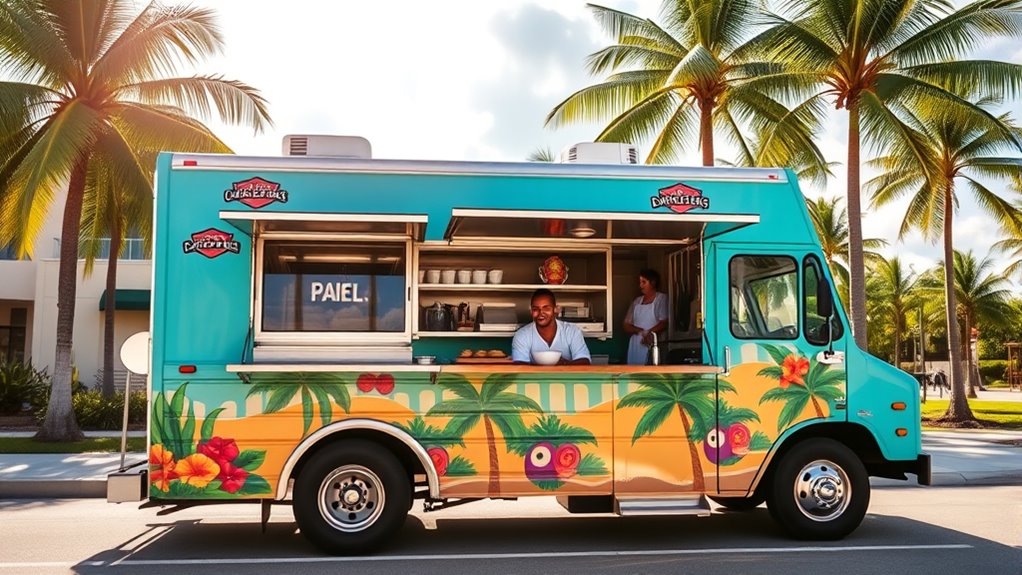
When setting up your base of operations, you need to take into account shared kitchen licensing requirements to stay compliant with local laws. Designing a custom kitchen layout ensures your space is efficient and meets health standards. Dog names can also be a fun way to personalize your food truck branding and attract loyal customers. By addressing these points early, you’ll create a solid foundation for your food truck business.
Shared Kitchen Licensing Requirements
Are you wondering what licensing requirements you need to set up a shared kitchen for your food truck in Cape Coral? To operate legally, you must meet specific shared kitchen licensing requirements. These include obtaining a food service license, passing health inspections, and ensuring your kitchen complies with local health codes. Imagine a clean, well-organized shared kitchen:
| Kitchen Features | Licensing Requirements |
|---|---|
| Food prep stations | Proper sanitation and cleanliness |
| Refrigeration units | Regular health inspections |
| Ventilation system | License from local health department |
This setup ensures your shared kitchen is compliant and ready for food truck operations. Meeting these licensing requirements helps you avoid fines and keeps your food truck running smoothly in Cape Coral.
Custom Kitchen Layout Considerations
Designing a custom kitchen layout is essential to guaranteeing your food truck operates efficiently and meets all your specific needs. Start by planning your kitchen layout to maximize space and workflow. Think about how equipment placement affects movement; place frequently used appliances like grills, prep stations, and sinks within easy reach. Consider the sequence of food preparation to streamline operations and minimize cross-contamination. Ensure that your layout allows for proper ventilation and meets all safety standards. Adequate storage should be integrated seamlessly without cluttering your workspace. A well-thought-out kitchen layout helps you work faster, reduces stress, and improves service quality. Remember, the goal is to create a functional, safe, and efficient base of operations that supports your culinary goals and customer satisfaction.
Budgeting and Financing Your Food Truck
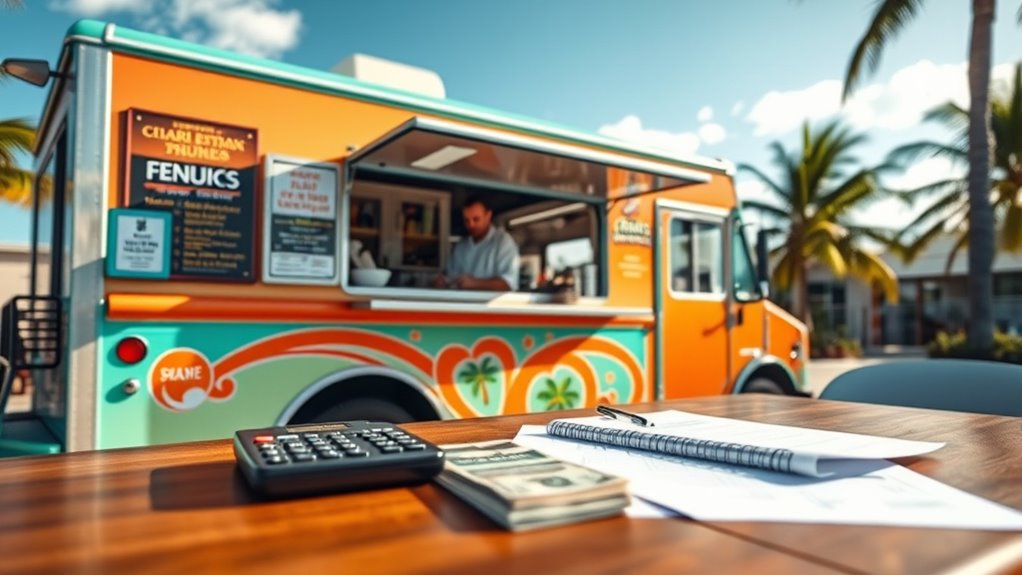
To get your food truck up and running, you need to plan for expenses like vehicle customization and insurance. Securing financing, such as a bank loan, can help cover these costs, but the application process requires careful preparation. Understanding the costs involved and the insurance requirements will keep your budget on track from the start. Utilizing AI-driven financial planning tools can assist in estimating expenses and managing your budget effectively.
Initial Vehicle Customization Expenses
Budgeting for your food truck’s initial vehicle customization is a crucial step that requires careful planning. Your expenses will include vehicle paint jobs, which can range from simple color coats to intricate designs that reflect your brand. Custom signage is another essential cost—think bold lettering and eye-catching graphics to attract customers. These upgrades not only enhance your truck’s appearance but also serve as mobile advertising. It’s important to set aside funds for professional installation and materials to ensure quality results. Keep in mind that unexpected costs may arise, so having a contingency budget helps prevent surprises. By estimating these expenses accurately, you’ll be better prepared to finance your vehicle customization and create a compelling, market-ready food truck.
Bank Loan Application Process
Securing a bank loan is a vital step in financing your food truck, especially when you need funds beyond your personal savings or investments. To start, gather detailed financial documents, including your credit history, income statements, and a solid business plan. Lenders will scrutinize your cash flow projections to guarantee you can repay the loan comfortably. Be prepared to negotiate loan terms such as interest rates, repayment periods, and collateral requirements. Clear understanding of these terms helps you avoid surprises down the line. Remember, a strong credit score and a well-prepared application increase your chances of approval. Once approved, carefully review the loan agreement before signing, ensuring it aligns with your budgeting plans and long-term goals for your Cape Coral food truck venture.
Liability Insurance for Food Trucks
Liability insurance is essential when operating a food truck, as it protects you from potential legal claims and financial losses. You need sufficient insurance coverage to handle accidents, injuries, or property damage that might occur during your business operations. When choosing your policy, pay close attention to liability limits, guaranteeing they are high enough to cover possible claims without leaving you exposed. Having the right liability limits can prevent significant out-of-pocket expenses if someone sues your business. Remember, many vendors and event organizers require proof of liability insurance before allowing you to operate on their premises. Investing in extensive coverage tailored to your food truck ensures you’re protected and can focus on growing your business with peace of mind.
Designing Your Menu and Pricing Strategy
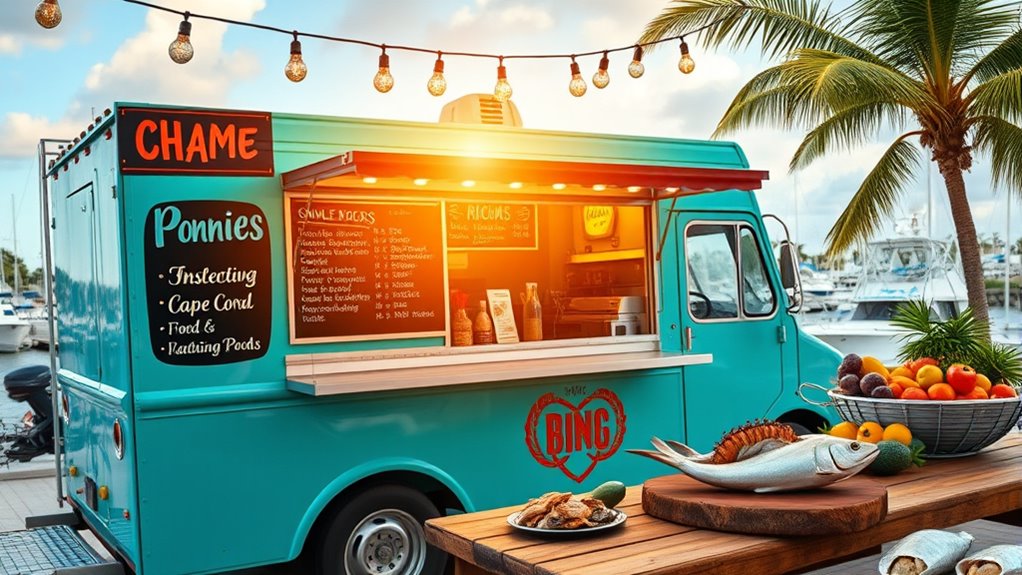
When designing your menu, focus on creating locally inspired dishes that resonate with Cape Coral’s community. Keep your costs in check by implementing effective cost control strategies to maximize profit. Balancing unique offerings with smart pricing will help attract customers and ensure your food truck’s success. Incorporating aesthetic presentation into your dishes can also enhance customer satisfaction and encourage repeat visits.
Crafting Locally Inspired Dishes
Creating a menu that highlights locally inspired dishes begins with understanding the flavors and ingredients unique to Cape Coral. Focus on ingredient sourcing by building relationships with local farmers and suppliers to get fresh, quality produce and seafood. This guarantees your dishes are authentic and support the community. When designing your menu, pay attention to food presentation; visually appealing dishes attract customers and enhance their experience. Incorporate regional flavors like fresh seafood, tropical fruits, and local herbs to create unique offerings that resonate with locals and visitors alike. Keep your dishes simple yet flavorful, emphasizing freshness and creativity. By emphasizing locally sourced ingredients and eye-catching presentation, your food truck will stand out in Cape Coral’s vibrant food scene.
Cost Control Strategies
Designing your menu and pricing strategy with cost control in mind helps guarantee profitability without sacrificing quality. Focus on ingredient sourcing by choosing local suppliers and seasonal produce to lower costs and ensure freshness. Carefully select menu items that share ingredients to reduce waste and streamline inventory management. Keep your menu concise, offering versatile dishes that appeal to your target customers while minimizing excess inventory. Implement waste reduction practices by monitoring portion sizes and repurposing leftovers creatively. Regularly analyze your food costs and adjust prices accordingly to maintain profit margins. By balancing appealing dishes with mindful ingredient sourcing and waste reduction, you create a sustainable menu that supports your bottom line and keeps customers satisfied.
Technology and Operations
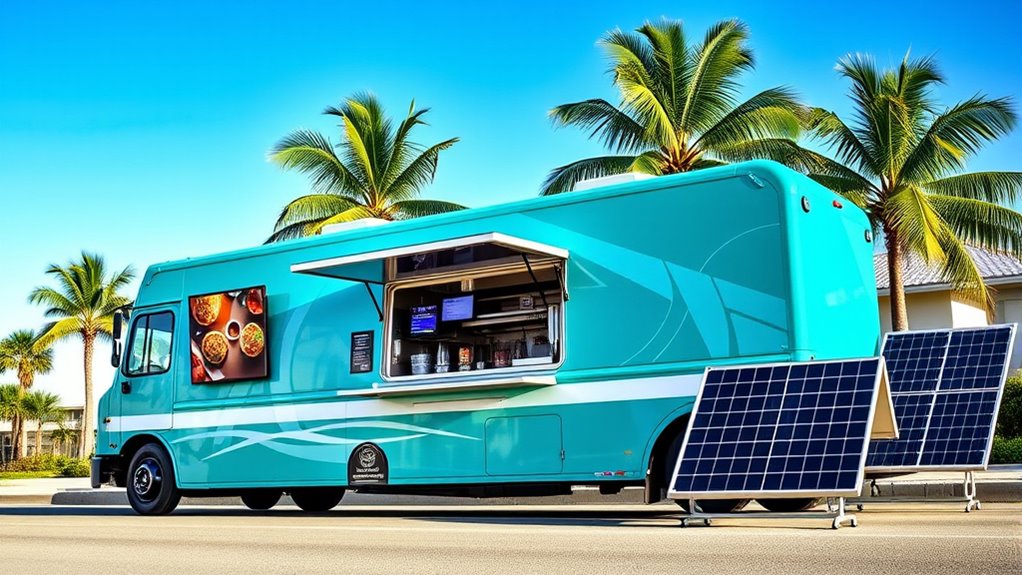
Using wireless card readers, mobile POS systems, and stock tracking tools can streamline your operations and improve customer service. These technologies make it easy to process payments quickly and keep track of inventory in real-time. Incorporating them into your food truck helps you run smoothly and stay ahead of the competition.
Wireless Card Readers for Vendors
Have you ever wondered how food truck vendors process payments quickly and securely on the go? Wireless card readers make this possible by enabling wireless payments and contactless transactions. These devices connect seamlessly to your smartphone or tablet via Bluetooth or Wi-Fi, allowing you to accept credit and debit cards instantly. They’re compact, durable, and designed for mobility, so you can serve customers without delays. With wireless card readers, you eliminate the need for cash, reduce errors, and speed up the checkout process. This technology guarantees transactions are secure, encrypted, and compliant with industry standards. By investing in a reliable wireless reader, you streamline operations and provide a smooth payment experience that keeps customers satisfied and coming back.
Mobile POS and Stock Tracking
Ever wonder how food truck vendors keep track of sales and inventory on the move? Using a mobile POS system simplifies this process, letting you process orders and payments seamlessly from anywhere. With integrated stock tracking, you can monitor ingredients and supplies in real-time, avoiding shortages or overstocking. This technology helps you stay efficient and organized. Consider these key benefits:
- Faster transactions and better customer service
- Accurate inventory management on the go
- Insightful sales data for smarter decisions
A reliable mobile POS system streamlines your daily operations, so you spend less time on admin and more time serving customers. Stock tracking features ensure you always know what’s available, reducing waste and improving profitability. Embracing this technology is vital for a successful food truck business in Cape Coral.
Marketing and Growing Your Presence
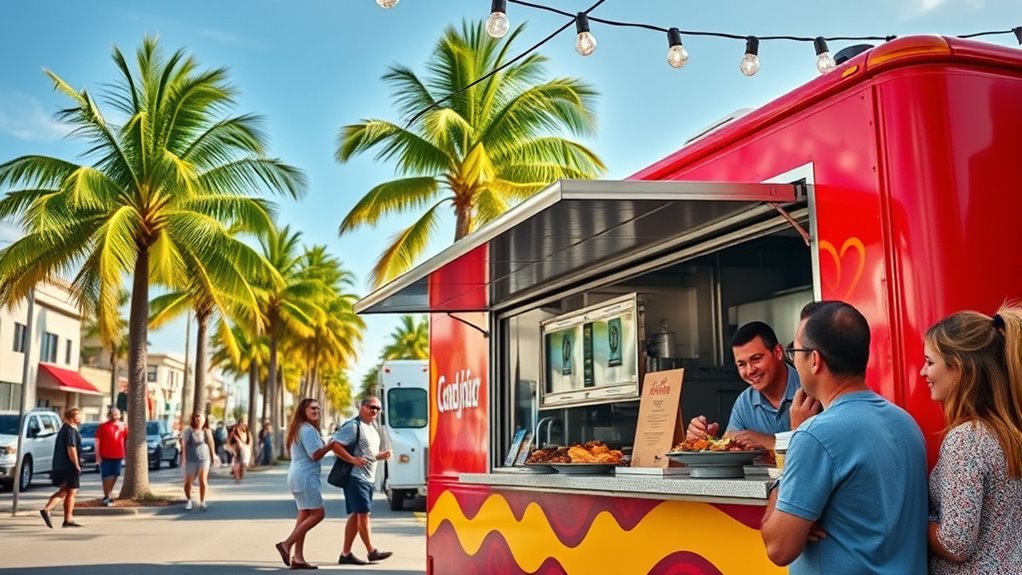
To grow your food truck’s presence in Cape Coral, you should focus on smart event scheduling and participating in local community events. Offering loyalty programs can keep customers coming back, while engaging in community activities boosts your visibility. These strategies help you build a loyal customer base and stand out in the busy local food scene.
Popular Event Scheduling Tips
Strategic event scheduling is essential for boosting your food truck’s visibility and attracting more customers in Cape Coral. When planning your food truck scheduling, focus on timing events when foot traffic is high and align with local happenings. Effective event coordination helps you avoid conflicts and maximize exposure. To optimize your efforts, consider these tips:
- Schedule your truck during popular local festivals and markets
- Coordinate with community organizations for special events
- Plan ahead for seasonal or holiday-themed events
Loyalty Programs and Community Events
Implementing loyalty programs and actively participating in community events are powerful ways to grow your food truck’s presence in Cape Coral. Loyalty programs encourage customer loyalty by rewarding repeat visits, turning casual customers into regulars who spread positive word-of-mouth. Use punch cards, mobile apps, or special discounts to keep customers engaged. Community engagement is equally essential; participating in local festivals, markets, and charity events helps your food truck connect with residents and boost visibility. These activities foster a sense of trust and belonging, making your brand a staple in Cape Coral’s food scene. By combining effective loyalty programs with active community involvement, you’ll strengthen your reputation, attract new customers, and ensure sustained growth for your food truck business.
Master Local Events to Thrive
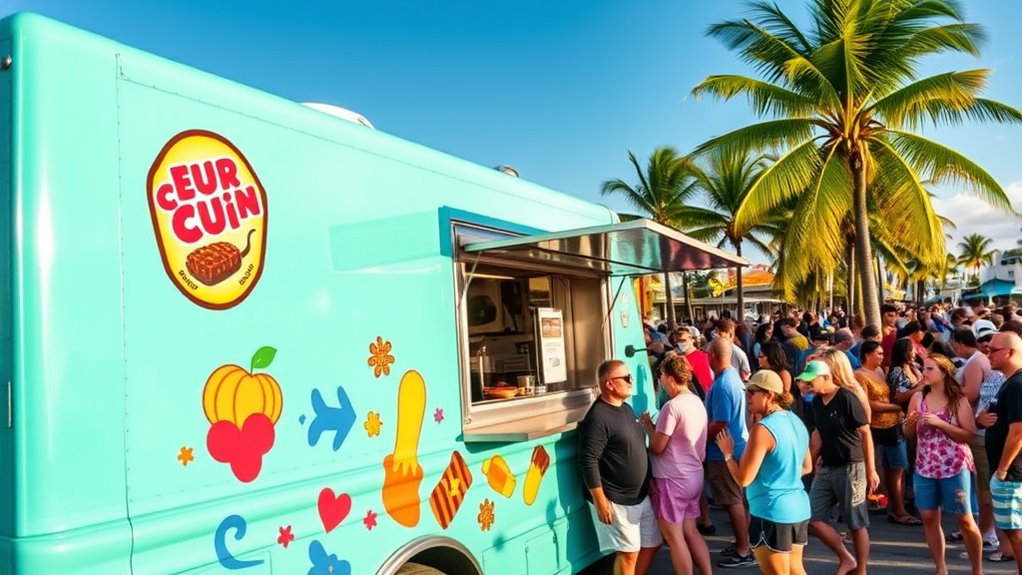
Wondering how your food truck can stand out in Cape Coral’s bustling scene? Mastering local events is key to boosting your visibility and growing your brand. Before each event, focus on your food truck branding—custom signage, logos, and a consistent look make your truck memorable. Use social media marketing to announce your participation, share behind-the-scenes content, and engage with local followers. During events, consider offering exclusive deals or limited-time menu items to draw attention. You can also:
Boost your Cape Coral food truck’s visibility by branding well, engaging locals online, and offering exclusive event deals.
- Collaborate with other local vendors or organizers
- Collect customer contact info for future marketing
- Share live updates and photos to increase online engagement
Frequently Asked Questions
What Are the Best Locations to Park a Food Truck in Cape Coral?
You should park your food truck at popular local spots like Rotary Park and Sun Splash Family Waterpark for high visibility. Attending food truck festivals is a great way to attract customers and build your brand. Additionally, consider locations near busy retail centers, parks, or popular events, where foot traffic is high. Always check local regulations and event schedules to find the best spots for maximum sales and exposure.
How Do I Hire Licensed Staff for My Food Truck Business?
You should start by researching local licensing requirements for food industry workers in Cape Coral. Use targeted employee recruitment strategies, such as job postings and local culinary schools, to find licensed staff. Once hired, invest in staff training to make certain your team is knowledgeable about food safety and customer service. This approach not only keeps you compliant but also builds trust with your customers, boosting your food truck’s reputation.
What Permits Are Needed for Overnight Parking or Storage?
You’ll need to check Cape Coral’s parking regulations for overnight parking and storage. Obtain a special permit if you plan to leave your food truck parked overnight or use public spaces for storage. Contact the local city or zoning department to confirm requirements, as regulations vary by location. Ensuring you have the proper permits prevents fines and helps you operate smoothly, especially when managing overnight storage or parking.
Are There Specific Health Codes Unique to Cape Coral?
Did you know Cape Coral conducts over 50 local health inspections annually? You don’t face unique health codes, but you must adhere to Florida’s general food safety standards. These standards emphasize proper food handling, sanitation, and storage. Cape Coral enforces these through regular inspections, ensuring food safety for your customers. Staying compliant means closely following local guidelines during your food truck operations, helping you avoid fines and build a trustworthy reputation.
How Can I Build a Loyal Customer Base in Cape Coral?
You can build a loyal customer base in Cape Coral by actively engaging on social media, sharing your menu and location updates regularly. Attend community events to connect directly with locals and showcase your food. Offer specials or loyalty programs that encourage repeat visits. Consistently providing quality food and excellent service will turn first-time customers into loyal supporters, helping your food truck thrive in the Cape Coral community.
Conclusion
Think of your food truck journey as steering a ship through Cape Coral’s waters. With a solid plan, understanding local winds, and a catchy flag, you’ll navigate toward success. Keep your course flexible, adapt to the tides of events and tastes, and soon you’ll discover your treasure—loyal customers and thriving business. Stay steady, embrace the adventure, and let your passion be the guiding star on this exciting voyage.
